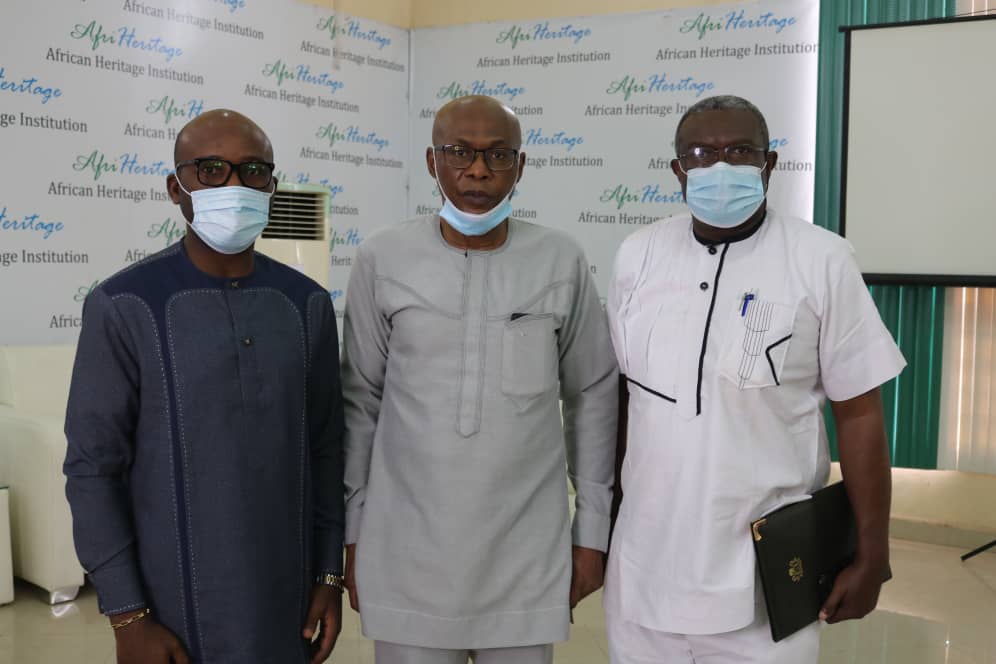General
Insecurity: AfriHeritage Advocates Social Inclusion

By Modupe Gbadeyanka
The need to adopt social inclusion and a proactive partnership with leaders of local communities to solve the national and human security challenges in Nigeria has been stressed by Africa’s leading think-tank and research institute, African Heritage Institution (AfriHeritage).
AfriHeritage recently partnered with the Institute for Peace and Conflict Resolution (IPCR) of the Ministry of Foreign Affairs to organise a seminar themed Trends and dynamics of armed banditry: making sense of the problem.
The event brought together industry captains, academicians, government representatives, and thought leaders in areas of security and peacekeeping to deliberate and proffer innovative ideas for sustainable solutions to Nigeria’s incessant security challenges.
The Executive Director of AfriHeritage, Prof Ufo Okeke-Uzodike, in his welcome address, stated that “after over six decades since independence, Nigeria is struggling to achieve basic human security needs of its people.
“Average Nigerians are consistently afraid of assorted security uncertainties. Nigerian parents and their children worry about personal safety at the markets, schools, churches and other places of worship.
“Even farmers worry about their personal safety because of reputed hoodlums or bandits as they attend to their farms or livestock.”
“These challenges persist because Nigeria remains a country of culturally disparate and unintegrated people who are still finding it difficult to work together with the view to solve common problems. Sadly, effective national and human security usually require meaningful and inclusive participation and ownership by citizens.
“While Big Ideas Podium events convene stakeholders for effective collaboration on critical issues, it is with the view to proffering big and unbiased ideas that could help policymakers formulate impactful public policies,” he added.
Also, the Director-General of IPCR, Dr Bakut Tswah Bakut, who was represented by Mr Andy Nkemneme (Deputy Director, Internal conflict Prevention and Resolution), emphasised the need for all to work together in harmony to achieve and maintain peace.
“The Big Ideas Podium would not have taken place at a better time than now considering the devastating impact of the conflict that is closing in on the nation’s safe spaces. Armed banditry has become one of the biggest threats to peace and security in Nigeria.
“IPCR of the Ministry of Foreign Affairs exists to strengthen the adoption of peace and conflict resolution mechanisms in Nigeria and across Africa. The IPCR has played and will continue to play vital roles in peace and conflict resolution in Africa and we thank AfriHeritage for this impactful collaboration in entrenching peace and security in Nigeria,” Bakut stated.
During his keynote address, Dr Chukwumemeka B. Eze, the Executive Director, African Network for Peace Building, Accra, Ghana, stated categorically that, “Moving forward, there is first of all the need to re-examine the existing strategies of mitigating the threat of armed banditry, identify the gaps and chart a new pathway towards sustainable peace.
“I want to state emphatically that armed banditry is not a problem that will be solved through the barrel of a gun. There is the need to revitalize activities that promote social inclusion and human security, which will provide prospects for transformative changes, peace and development in Nigeria.”
Mr Eze added that, “We must all realise that every environment has its peculiarities. These myriads of social cleavages can only be effectively taken care of if we collectively fashion out an efficient strategy to meet them.
“This we believe strongly can only be actualised through engagements like this. If you look around here we have women and men from all the six geo-political zones and who from their academia, CSO or hybrid has been a big player in the issues that confront us.
“I have no doubt therefore that we will be having stimulating discussions and the outcomes and conclusions would be contributory in designing and envisioning the future we desire and deserve.”
Furthermore, the discussants reflected briefly on different dimensions of the subject matter and proffered ideas on relevant solutions for Nigeria.
Anthony Odo Agbor of the Federal University, Wukari, Taraba State, highlighted the impact of armed banditry on families, livelihoods, and Human Security; Dr Kingsley Udeh, the Special Adviser to the Governor of Enugu State on Education, outlined the impact of armed banditry on education and human capital development; and Eng. Umar Ibrahim of Kano Electricity Distribution Company explicitly highlighted the impact of armed banditry on communities, human life and socio-economic development.
Over the years, AfriHeritage has influenced transformative public policies in Nigeria by providing effective platforms like the Big Ideas Podium for objective discussions on salient issues that affect the public in Nigeria.
The Institution remains deeply committed to bridging the ideas and data gaps in the formulation and implementation of transformative public policies in Nigeria and across the continent.
General
INEC Shifts 2027 Presidential, N’Assembly Elections to January 16

By Adedapo Adesanya
Nigeria will hold next year’s presidential and National Assembly elections a month earlier than planned, after the Independent National Electoral Commission (INEC) revised the polling schedule.
The elections will be held on January 16, instead of the previously announced date of February 20, INEC said in an X post, signed by Mr Mohammed Kudu Haruna, National Commissioner and Chairman, Information and Voter Education Committee.
There were also changes to the Governorship and State Houses of Assembly elections initially fixed for Saturday, March 6 2027, in line with the Electoral Act, 2022, have now been moved to Saturday, February 6, 2027.
The electoral commission said the changes were caused by the enactment of the Electoral Act, 2026 and the repeal of the Electoral Act, 2022, which introduced adjustments to statutory timelines governing pre-election and electoral activities.
“The Commission reviewed and realigned the schedule to ensure compliance with the new legal framework,” it said.
INEC said party primaries (including resolution of disputes) will commence on April 23, 2026 and end on May 30, 2026, after which Presidential and National Assembly campaigns will begin on August 19, 2026, while Governorship and State Houses of Assembly campaigns will begin on September 9, 2026.
It noted that campaigns will end 24 hours before Election Day, and political parties have been advised to strictly adhere to the timelines.
INEC also stated it will enforce compliance with the law.
The electoral body also rescheduled the Osun Governorship election which was earlier scheduled for Saturday, August 8 2026, by a week to Saturday, August 15, 2026.
INEC noted that some activities regarding the Ekiti and Osun governorship elections have already been conducted, and the remaining activities will be implemented in accordance with the Electoral Act, 2026.
Speaking at a news briefing in Abuja two weeks ago, the chairman of INEC, Mr Joash Amupitan, expressed the readiness of the commission to conduct the polls next year.
The timetable issued by the organisation for the polls at the time came when the federal parliament had yet to transmit the amended electoral bill to President Bola Tinubu for assent.
Later that week, the Senate passed the electoral bill, reducing the notice of elections from 360 days to 180 days, while the transmission of results was mandated with a proviso.
General
NIMASA Rallies Stakeholders’ to Develop National Action Plan

By Adedapo Adesanya
The Nigerian Maritime Administration and Safety Agency (NIMASA) has pledged its commitment to provide the regulatory leadership, technical coordination, and stakeholder engagement required to successfully develop and implement a robust National Action Plan on maritime decarbonization in Nigeria.
The Director General of the agency, Mr Dayo Mobereola, made this known during the National Stakeholders’ workshop on the development of a National Maritime Decarbonization Action Plan, further describing the workshop as a critical step in actualising the Federal Government’s blue economy and climate objectives.
Represented by the Executive Director, Operations, Mr Fatai Taiye Adeyemi, the NIMASA DG underscored the significance of the IMO GreenVoyage2050 Project, a technical cooperation initiative /designed to support developing countries in implementing the IMO GHG Strategy.
According to him, the National Action Plan being developed will reflect national realities, leverage existing capacities, address identified gaps, and align with broader economic and environmental priorities of the federal government.
Mr Mobereola stressed that “this transition is not merely about compliance with international obligations, it is about safeguarding our marine environment, protecting public health, strengthening the blue economy, and ensuring that our maritime industry remains competitive and future-ready”, the DG said.
Also speaking at the event was the Technical Manager of the IMO GreenVoyage2050 Project, Ms Astrid Dispert, who highlighted that the overarching objective of the initiative is to advance a coherent and globally aligned regulatory framework to accelerate maritime decarbonization.
She also emphasised that NIMASA plays a pivotal role in driving the project at the national level.
The IMO GreenVoyage2050 Project provides technical expertise and institutional support to assist countries in developing and implementing National Action Plans that promote sustainable shipping practices, encourage investment in clean technologies, and strengthen capacity for long-term emissions reduction.
Through this collaboration, the federal government is advancing deliberate steps towards maritime decarbonization, reinforcing its commitment to global climate goals and ensuring a cleaner, greener, and more sustainable future for the sector.
General
BPP Mandates Digital Submission for MDAs From March 1

By Adedapo Adesanya
The Bureau of Public Procurement (BPP) has directed all Ministries, Departments and Agencies (MDAs) to comply with its digital submission process effective March 1.
The directive was contained in a circular signed by the Director-General of the Bureau, Mr Adebowale Adedokun, noting that the move was part of the bureau’s commitment to digital transformation and paperless governance.
It explained that the transition followed an earlier circular of Aug. 4, 2025, which introduced electronic submission procedures.
According to the bureau, it has successfully moved from physical filings to a dedicated e-mail service for document submissions and is now advancing to a more robust and integrated system.
The circular announced the inauguration of the BPP Digital Submission Portal, a web-based platform designed to enable MDAs submit procurement-related documents directly to the Bureau.
It stated that the automated platform would streamline the submission process, enhance transparency and ensure accelerated tracking of procurement-related documents and petitions.
“With effect from March 1, all MDAs will be required to use the portal to submit requests for ‘No Objection’ Certificates, approvals for ‘No Objection’ for special procurements, clarifications and status updates on submissions,” the bureau said.
It added that the portal would be hosted on the Bureau’s official website and would become fully operational from the effective date.
The bureau warned that physical submissions or manual hand-deliveries would no longer be prioritised and would eventually be rejected following the full transition to the digital platform.
It urged accounting officers to brief their procurement departments and ICT units on the development to ensure seamless processing of procurement activities from March 1.
It further advised MDAs to contact the Bureau via its official email for information on the onboarding process and integration into the portal.
The bureau emphasised that full compliance by all MDAs was required to ensure a smooth transition and avoid delays in the implementation of the 2026 fiscal year procurement processes.
-

 Feature/OPED6 years ago
Feature/OPED6 years agoDavos was Different this year
-
Travel/Tourism10 years ago
Lagos Seals Western Lodge Hotel In Ikorodu
-

 Showbiz3 years ago
Showbiz3 years agoEstranged Lover Releases Videos of Empress Njamah Bathing
-

 Banking8 years ago
Banking8 years agoSort Codes of GTBank Branches in Nigeria
-

 Economy3 years ago
Economy3 years agoSubsidy Removal: CNG at N130 Per Litre Cheaper Than Petrol—IPMAN
-

 Banking3 years ago
Banking3 years agoSort Codes of UBA Branches in Nigeria
-

 Banking3 years ago
Banking3 years agoFirst Bank Announces Planned Downtime
-

 Sports3 years ago
Sports3 years agoHighest Paid Nigerian Footballer – How Much Do Nigerian Footballers Earn














